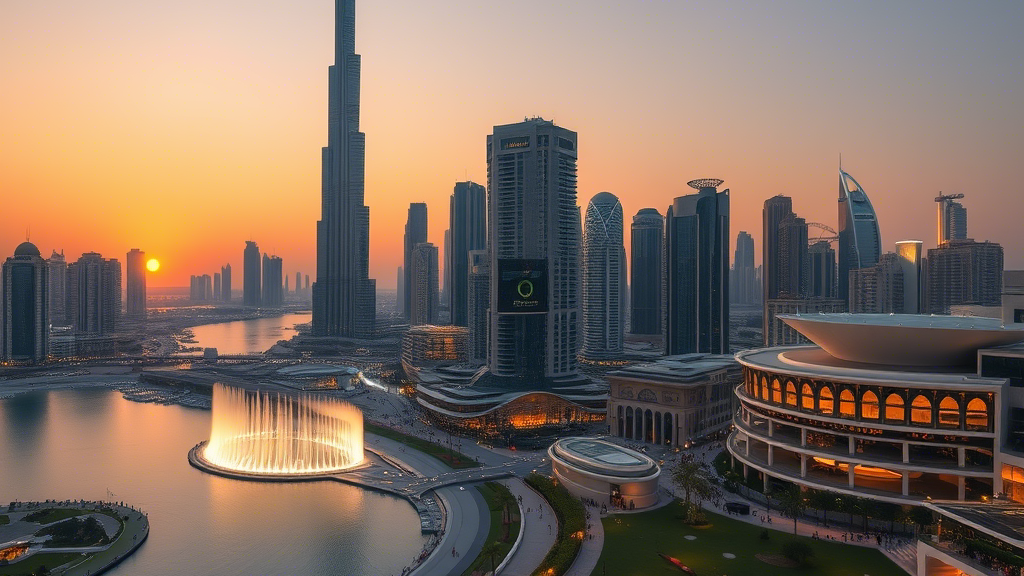Now Reading: Dubai Real Estate: 5 Corporate Tax Myths Affecting Buyer Decisions
-
01
Dubai Real Estate: 5 Corporate Tax Myths Affecting Buyer Decisions
Dubai Real Estate: 5 Corporate Tax Myths Affecting Buyer Decisions

Table of Contents
Dubai’s real estate market remains a magnet for U.S. investors, offering a tax-free environment for individuals with no personal income tax, capital gains tax, or annual property taxes, allowing 100% retention of rental income and resale profits. This contrasts sharply with U.S. markets, where taxes can reduce returns by 15-30%.
The UAE dirham’s peg to the U.S. dollar eliminates currency risk, and the Golden Visa, granting 10-year residency for investments of AED 2 million ($545,000), enhances appeal. In 2025, Dubai’s market is thriving, with Q1 transactions reaching AED 110 billion and a 19.9% price increase, per Dubai Land Department data.
However, misconceptions about the UAE’s corporate tax, introduced in 2023 under Federal Decree-Law No. 47, often confuse buyers, particularly those using corporate structures for property investments. This article debunks five corporate tax myths affecting buyer decisions in Dubai’s real estate market, empowering U.S. investors to make informed choices in 2025.
Myth 1: Corporate Tax Applies to All Real Estate Investors
Reality: The UAE’s 9% corporate tax applies only to businesses with taxable income exceeding AED 1 million ($272,000) annually, per Federal Decree-Law No. 47 of 2023. Individual investors, who make up most Dubai property buyers, are exempt from personal income tax, including on rental income and capital gains.
For example, a $1 million apartment in Dubai Marina yielding 7% generates $70,000 tax-free annually for individuals, unlike U.S. markets where taxes cut returns to $49,000-$56,000. Corporate entities, like those in DMCC free zones, may qualify for 0% tax if income is below AED 5 million or from non-mainland sources. U.S. investors using corporate structures must report under IRS Controlled Foreign Corporation (CFC) rules via Form 5471.
Myth 2: Corporate Tax Increases Property Purchase Costs
Reality: The 9% corporate tax does not directly impact property purchase costs for individual buyers, as it applies to business profits, not property transactions. The primary cost is the 4% Dubai Land Department (DLD) transfer fee, far lower than U.S. transaction taxes (5-8%).
For residential properties, first sales within three years are zero-rated for VAT, per Federal Decree-Law No. 8 of 2017, as seen in projects like Emaar’s Creek Crescent (AED 1.3 million, $354,000). Corporate buyers may face VAT if properties are commercial, but residential investments remain unaffected. U.S. investors should confirm developer VAT compliance to avoid unexpected costs.
Myth 3: Domestic Minimum Top-Up Tax (DMTT) Affects All Corporate Buyers
Reality: The 15% Domestic Minimum Top-Up Tax (DMTT), effective from January 1, 2025, under the OECD/G20 Pillar Two framework, applies only to multinational enterprises with global revenues exceeding €750 million ($800 million). Most U.S. investors, even those using free zone companies like DMCC, are unaffected unless part of such conglomerates.
For example, a $2 million villa in Palm Jumeirah yielding 6.5% generates $130,000 tax-free annually for individual or small corporate buyers, with no DMTT liability. Free zone entities with income below AED 5 million remain tax-exempt. U.S. investors must ensure CFC compliance to avoid IRS penalties.
Myth 4: Corporate Tax Eliminates Free Zone Tax Benefits
Reality: Free zone companies, such as those in DMCC or Jebel Ali, retain significant tax benefits despite the 9% corporate tax. Entities with qualifying income (e.g., less than 5% mainland revenue or below AED 5 million) enjoy 0% tax, making them ideal for holding real estate.
For instance, a DMCC company owning a $1.5 million apartment in Business Bay yielding 7% avoids UAE corporate tax if structured correctly, while saving on U.S. taxes compared to domestic properties. Setup costs start at AED 20,000 ($5,400) annually, so weigh benefits for portfolios under $1 million. U.S. investors must file Form 5471 for CFC compliance.
Myth 5: Corporate Tax Complicates Property Tokenization
Reality: Blockchain-based property tokenization, growing in 2025, is not inherently complicated by corporate tax. Residential token sales in projects like Azizi Riviera in MBR City (AED 600,000, $163,000, 7-8.5% yields) are zero-rated for VAT if sold within three years, and rental income remains tax-free for individuals.
Tokens classified as “virtual assets” may qualify for VAT exemptions, per FTA guidelines, while corporate buyers face tax only if profits exceed AED 1 million. Smart contracts reduce legal costs by up to 50% (AED 5,000-$10,000). U.S. investors must report tokenized income on Schedule E and confirm token VAT status.
U.S. Tax Compliance Considerations
Dubai’s tax-free status for individuals delivers superior returns compared to U.S. cities like New York (2-4% yields). A $1 million property yielding 7% generates $70,000 tax-free annually, versus $50,000-$60,000 after U.S. taxes. U.S. investors must report rental income on Schedule E, deducting expenses like depreciation, maintenance, and management fees.
Foreign assets over $50,000 (single filers) or $100,000 (joint filers) require Form 8938, and accounts exceeding $10,000 need an FBAR. Non-compliance risks penalties up to $100,000. Corporate buyers must file Form 5471 for CFC compliance. The 4% DLD transfer fee isn’t creditable against U.S. taxes. Consult a tax professional to optimize deductions.
Risks and Mitigation Strategies
Dubai’s market is robust, with AED 306.3 billion in 2024 transactions and a projected 5-9% price increase in 2025. Risks include off-plan delays, oversupply in areas like JVC, and global economic factors like oil price volatility. Misunderstanding corporate tax rules can lead to overestimating costs. Mitigate by choosing developers like Emaar or Azizi, verifying escrow and VAT compliance with DLD, and diversifying across zones like Dubai Marina and Downtown Dubai.
Why Dubai in 2025?
Dubai’s Economic Agenda D33, targeting a doubled economy by 2033, and 25 million projected tourists in 2025 drive demand in no-tax districts. Yields of 6-10%, zero personal taxes, and Golden Visa benefits outpace global hubs like London (3-5%) or Singapore (3-5%). Debunking these corporate tax myths empowers U.S. investors to confidently invest in high-yield projects like those in Dubai Creek Harbour or Palm Jumeirah, leveraging tax efficiencies and strong market fundamentals.
In conclusion, understanding these five corporate tax myths clarifies Dubai’s tax advantages for U.S. investors. By leveraging tax-free rental income, zero-rated VAT, and free zone benefits, while ensuring IRS compliance, investors can maximize wealth in one of the world’s most dynamic real estate markets in 2025. Real Estate
read more: Dubai Housing Market: 7 Tax-Safe Projects in Luxury Investment Areas






















